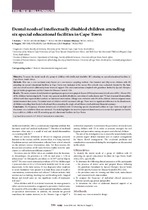| dc.contributor.author | Roberts, T | |
| dc.contributor.author | Chetty, M | |
| dc.contributor.author | Kimmie-Dhansay, F | |
| dc.contributor.author | Fieggen, K | |
| dc.contributor.author | Stephen, Lawrence X.G.S | |
| dc.date.accessioned | 2016-10-05T15:15:36Z | |
| dc.date.available | 2016-10-05T15:15:36Z | |
| dc.date.issued | 2016 | |
| dc.identifier.citation | Roberts, T. et al (2016). Dental needs of intellectually disabled children attending six special educational facilities in Cape Town. South African Medical Journal, 106(6): S94-S97 | en_US |
| dc.identifier.issn | 2078-5135 | |
| dc.identifier.uri | http://hdl.handle.net/10566/2437 | |
| dc.identifier.uri | http://dx.xoi.org/10.7196/SAMJ.2016.v106i6.11006 | |
| dc.description.abstract | OBJECTIVE. To assess the dental needs of a group of children with intellectual disability (ID) attending six special educational facilities in
Cape Town, South Africa.
METHODS. This was a cross-sectional study based on a convenience sampling method. One hundred and fifty-seven children with ID
attending six special educational facilities in Cape Town were included in the survey. Five schools were exclusively funded by the State
and one school received additional private financial support. The oral examinations complied with guidelines drafted by Special Olympics
Special Smiles programme and the Centers for Disease Control, USA.
RESULTS. The most common dental disorders requiring management were gingival disease (69%) and untreated dental caries (68%). Almost 50%
of the children had missing teeth. Twenty-nine percent needed orthodontic correction of malocclusion and 7% had structural abnormalities
of their teeth that required either aesthetic or functional intervention. Fillings were evident in only 8% of the children. Females required more
dental treatment than males. The dental needs of children with ID increased with age. There were no significant differences in the dental needs
of children attending State-funded schools and those attending the single school that received additional financial assistance.
CONCLUSION. The frequency of unmet dental needs of children with ID attending special educational facilities in Cape Town was high and
the dental care available to them was minimal. The study highlights the need for improved dental services to ensure that optimal oral health
is accessible to children with ID attending special educational facilities in Cape Town. | en_US |
| dc.language.iso | en | en_US |
| dc.publisher | Health & Medical Publishing Group | en_US |
| dc.rights | The South African Journal Medical Journal is an Open Access Journal and provides immediate open access to its content on the principle that making research freely available to the public supports a greater global exchange of knowledge. | |
| dc.source.uri | http://dx.xoi.org/10.7196/SAMJ.2016.v106i6.11006 | |
| dc.subject | Paediatric dentistry | en_US |
| dc.subject | Paediatric patients | en_US |
| dc.subject | Western Cape | en_US |
| dc.subject | Dental needs | en_US |
| dc.subject | Intellectual disability (ID) | en_US |
| dc.title | Dental needs of intellectually disabled children attending six special educational facilities in Cape Town | en_US |
| dc.type | Article | en_US |
| dc.privacy.showsubmitter | FALSE | |
| dc.status.ispeerreviewed | TRUE | |
| dc.description.accreditation | DHET | en_US |

